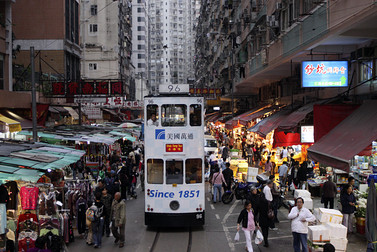By Craig Stephen May 2, 2010
HONG KONG (MarketWatch) -- The Greek sovereign-debt crisis and fiscal frailty of many European nations can reinforce the idea that the time has come for Asia -- state finances here are in good health, supported by business-friendly governments and minimal welfare burdens.
But as the violent stand-off with "Red Shirt" protesters in Thailand's capital Bangkok highlights, Asia has its own share of problems too. Widening income differentials and the stranglehold of big business on the economy means trickle-down global capitalism has its limits. Now political risk is center-stage, as equity capital heads for exits.

Around Asia, neighboring governments will be watching Thailand anxiously -- might they be the next to face copycat popular protests?
In the booming gambling enclave of Macau, you might expect contentment, but 41 people were injured over the weekend when May Day clashes turned ugly. Over in the Philippines, with the election a week away, there are worries more violence may erupt which have already seen candidates murdered.
Hong Kong may seem an unlikely candidate for its own Red Shirt protest, but as we approach the hot summer months, an increasingly unpopular government is facing growing criticism on multiple fronts.
But here, just like in the U.S. where Goldman Sachs is being put through the ringer, there is growing scrutiny of business practices. Amid a new global consensus to regulate some of the socially unacceptable behaviors of financial markets and corporates, Hong Kong's governance looks increasingly like a misplaced relic from a bygone age.
The government faces criticism of over its handling of a property bubble worsened by a supply-starved real-estate market, home-grown pollution and a lack of progress towards universal suffrage that might bring with it some accountability.
It has also allowed popular moves to introduce a competition law and a minimum wage (a figure of just 33 Hong Kong dollars per hour is being vigorously opposed) to be endlessly delayed. The common feature on this list is that any progressive policy, such as paying a living wage for security guards or cleaning staff would go against the narrow interests of the tycoon-controlled business lobby. This might sound more like 19th century Victorian England than Asia's self proclaimed "World City."
One recent conversation I had with a former administration official described it as a government in paralysis, scared by the sight of its own shadow. Without a political mandate, other than to covet the blessing of Beijing, the fear is the government is only one policy misstep from triggering the kind of mass protest last seen in 2003, when half a million people marched in protest on July 1, 2003, the sixth anniversary of annexation of Hong Kong by China.
Exacerbating tensions are the global stimulus policies of low interest rates and plentiful liquidity that have sent property markets in Asia soaring, as well as some core food prices. Any government that allows the price of basic human needs -- food and shelter -- to spiral out of control will have a problem. From China to Hong Kong and Singapore, governments are trying to take the heat out of property prices.
In Hong Kong the debate on property has gone from marveling at the ever-higher prices to anger at the dubious sales practices of developers. If paying some of the highest property prices in the world was not enough, buyers face a lottery trying to work out the size, price, or even true location of the unit they are purchasing. Buyers get to view show apartments that bare little resemblance to what they end up with and can find transaction prices were set by staff purchases related to the developer.
If we were talking about stock rather than property trades, the regulator would be handing out some stiff fines or jail time. But still, the government is happy to only tinker with a system where developers are allowed to regulate themselves.
The overriding feeling is that this is a market rigged in favor of the insiders, even if it is less sophisticated than buying a collateralized debt obligation from Goldman Sachs. Of course, the outcry will only come when the bubble unravels if it is shown this was not a transparent and clean market.
If government policy fails to demonstrate that public interest doesn't always come second to that of big business and Beijing, it risks stoking up a Red Shirts problem and political risk.